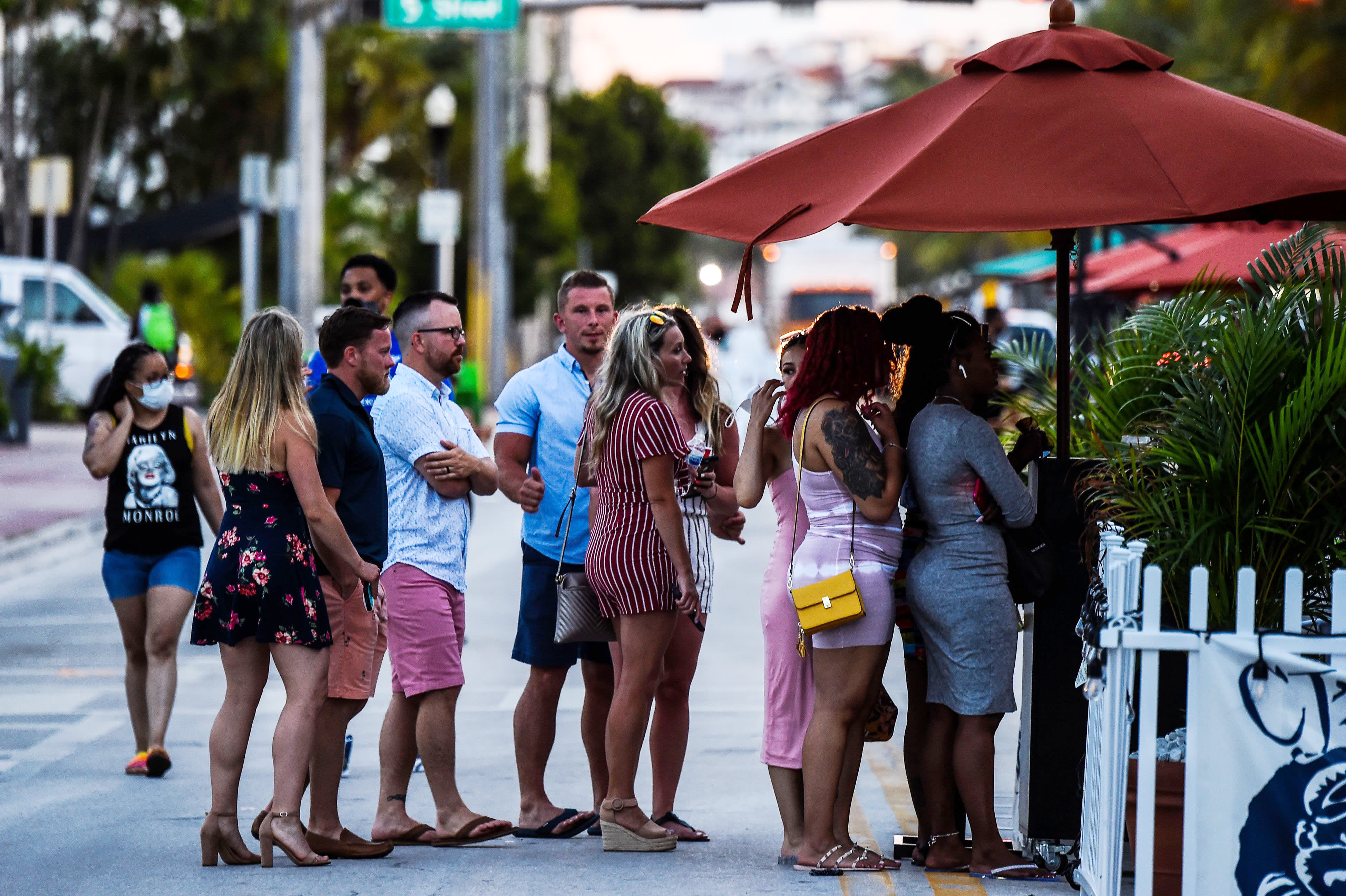
People stand in queue to enter a restaurant on Ocean Drive in Miami Beach, Florida on June 26, 2020.
Chandan Khanna | AFP | Getty Images
The list keeps getting longer.
Governors in Michigan, Florida, Texas, California, Colorado and Arizona are closing thousands of bars again ahead of the Fourth of July weekend as Covid-19 cases in those states surge.
For bar owners, the rollbacks have sown confusion and stress, and threaten the survival of their businesses. Many spent their much-needed cash to reopen, only to close again days or weeks later.
“The stop and start costs thousands of dollars for every business,” said David Kaplan, co-owner of Death & Co, a cocktail lounge with locations in Los Angeles, Denver and New York.
The Texas Bar and Nightclub Association is suing the state over Gov. Greg Abbott’s decision to close bars for the second time in three months. Dozens gathered in Austin to protest the rollback.
As the U.S. sets record highs for new cases in a single day, other states are slowing their efforts to reopen their economies. New Jersey and New York City have both indefinitely postponed the return of indoor dining.
Viral videos posted on social media show consumers packed inside and outside of bars across the country. Meanwhile, several outbreaks have been linked to local bars, including nearly 140 cases in East Lansing, Michigan.
Kaplan said that bars that don’t enforce social distancing measures make it more difficult for the bars and restaurants that are trying to be safe. But the economic pressure of the crisis and limited guidance from government officials also poses a challenge.
“The guidance is so slim, and then the enforcement is kind of nonexistent, so it’s tough,” Kaplan said. “I think most folks, if they’re not doing things well, probably want to or they’re trying, but it’s a totally different way of operating.”
Only the Denver location of Death & Co, which technically operates as a restaurant, is open again. Kaplan’s team spent about $3,500 to reopen the Los Angeles bar before halting plans when cases in California began spiking again. Gov. Gavin Newsom closed bars and indoor dining on Wednesday in 19 counties, including Los Angeles.
“We have to find a middle ground, because if we don’t find a route to open, we face permanent closure,” Kaplan said. “It’s not if and when we feel safe, it’s if and when we feel the risk is at an acceptable level and our team is comfortable to continue the reopening process. It’s a terrible decision, honestly.”
Todd Conner, owner of The Offbeat and The Good Nite bars in Los Angeles, said that he was happy to be closed for the safety of the community, but the city made a mistake to reopen bars so soon. Los Angeles cleared bars to reopen on June 19.
“I think they jumped the gun here,” said Conner. “If they had waited, it would have saved me a lot of time and resources — resources that would’ve been better spent when the day does come to reopen.”
When Los Angeles moves to reopen bars for the second time, Conner said that he’ll be proceeding with more caution.
“By all the wishy-washy back and forth and bad decision-making, we’re starting to lose faith in the system, that they have our backs here,” he said.
Bars vs. restaurants
Some bar owners criticized the decision to treat bars and restaurants differently, even though many restaurants also serve alcohol to customers.
Todd Quigley owns Craft and Growler, a Dallas-based craft beer bar. While his establishment also serves food, Texas classifies it as a bar. When the state reopened restaurants before bars, his to-go sales went from about half of pre-pandemic levels to about 10%. And now that bars are once again shuttered, that trend is returning — and the money from his Paycheck Protection Program loan has run out.
“If we’re not the same as restaurants, I get killed,” Quigley said, noting that he’s obeyed Covid-19 protocol.
“It’s not a restaurant or bar classification, it’s ownership and management. And you’ve got to shut down the places that don’t do it right,” he added.
In Florida, police officers told several restaurants that they had to close because they had bars, according to Carol Dover, CEO of the Florida Restaurant and Lodging Association.
“Most of the restaurants, unless you’re quick service, will have a bar inside. And so, there was a lot of confusion, on the law enforcement side, that those bars had to be closed,” Dover said.
The rollbacks could also mean furloughing rehired workers. The U.S. unemployment rate fell to 11.1% in June, according to the Department of Labor, with the leisure and hospitality sector gaining 2.1 million jobs — or about 40% of the growth.
“I’ve got to decide, do I stay open at all or not? I’d rather do what I’m doing and keep people off unemployment, but the state of Texas has put me in a very bad position,” Quigley said.


